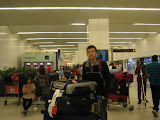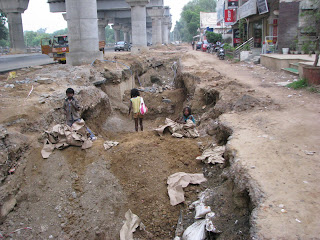The pleasures:
I love the Spoken Web project; its vision and possibilities. I sit at meetings sometimes and get goose bumps as we talk to customers/agencies that want to deploy this, and as I listen to where and how they want to use it. It is a project with so much potential to do good for the world, and also to make money for IBM. What a winning combination. Plus, it leverages all of the things that I love to do - - application design, human factors, technical assessment, speech technology, "accessibility" across the digital divide, new business development. I feel so fortunate to have this opportunity.
The people at IRL have been wonderful to work with professionally, and personally. They have been incredibly helpful to me during this transition to India, where I need all sorts of advice and sometimes transport. They are smart, and (of course) deeply committed to the Spoken Web vision, which gives us an immediate bond.
There is so much palpable energy in "emerging markets," where there is continuous growth and even more potential to grow. At Manish's quarterly meeting, he displayed a range of photos of new employees for all to welcome. But then he chastised the team that we still weren't meeting our targets with respect to bringing in more and more world class hires. It has been years since US corporations have presented such messages to their teams.
I love the newness of everything. Everything is a learning experience; everywhere you look is something interesting and novel. It's like being a kid again - - all the "mundane" experiences are exciting again -- going to work, the bank, the market, whatever. Everything is done differently (sometimes small and subtle differences; sometimes major ones....sometimes for better, sometimes for worse.)
I love listening to Adam come to grips with all of the new experiences. Figuring out "what DO you do when someone in a pathetic state raps on your window and asks for money? What do you do when multiple people do that?" There are so many social action projects to take on....watching him figure out where he can have the most impact. Watching him engage with kids from all over the world at the American Embassy School. What a set of experiences he will leave with.
I know that the cheap labor here is the flip side of the profound poverty. But it is really nice to have household help at VERY affordable rates to cook dinner for when you get back from work, and even iron the sheets. (Have our sheets *ever* been ironed? I doubt it...) I have taken to asking Indian people what they love about India, and the household service support ranks pretty high on the list...(One colleague I spoke to compared India to the US, and pointed out that middle class people here live like kings. He said - -"Would I want to be in a place where I have to spend the weekend mowing the lawn? Or where my wife does dishes every night? You have to be kidding me....")
Getting my hair washed and blow dried (de-tangled and de-frizzed) at a high-end salon for about $10. (and that's with TWO people working on it...one holding the brush, the other holding the hairdryer.) I don't plan on washing my hair on my own at all this year....
The challenges:
Poverty visible wherever you turn. It is even visible to me in one of the “features” of Indian life, which is lots and lots of service assistance, at really low cost. From an economic perspective, people will work for low wages when there is rampant unemployment and any job will do. So the luxurious availability of maids, cooks, and drivers at very affordable rates is just another symbol to me of a country with deep economic woes.
The chaotic traffic; figuring out how to cross streets and whether pedestrians ever have right of way. A friend of mine commented that she “appends” herself to other people who look like they know how to cross the street….I have begun doing the same.
Stray animals in the streets. The dogs particularly break my heart.
The deeply rooted bureaucratic processes for everything. Opening a bank account, getting a cellphone account, joining a gym. Everyone needs pictures, copies of passports, copies of visas, letters substantiating that I am on a work assignment here, documentation substantiating my home address, etc. etc. When they are missing some tidbit (like yet one more signature), they send couriers to your office.
Not being able to get into your car and drive yourself somewhere spontaneously; dependency on a "driver."
Figuring out where to buy a range of things that we consider “routine,” like desk lamps. (Apparently not a common item here.)
Not knowing how to bargain and drive down prices (and not liking that process anyway)….not knowing when I am being given a price that is twice what I should be paying, with the vendor expecting me to bargain it down…
Not being able to drink water from the tap; remembering to bring bottled/filtered water wherever I go.
Power outages; random power fluctuations and surges (One such surge burnt out some of our home electronics, even though they are plugged in through surge protectors...the fluctuation apparently exceeded the capacity of the surge protectors.)
Water tanks that need to be filled each morning; failure to fill means failure to get water that day
Sterilizing fruit and vegetables














